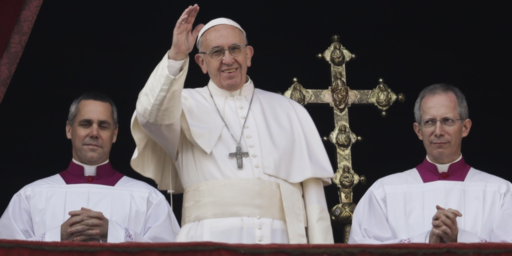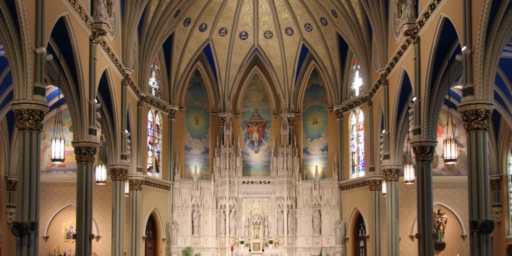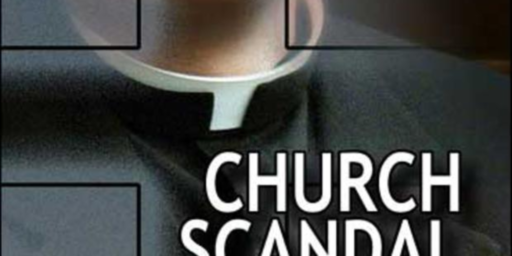Papal Candidates: Cardinal Dario Castrillón Hoyos, Colombia
If his name sounds familiar, it’s probably because Cardinal Castrillón Hoyos has been a central figure in some of the most high-profile issues. His wide-ranging activities reflect a particular vision of religious life — something that he has crafted as Prefect of the Congregation for the Clergy. Priests, he believes, “must be involved in all that concerns the spread of Christ’s Kingdom, and, consequently, the eternal salvation of souls.” Thus he has not only worked on such projects as the General Catechetical Directory, but he has also directly addressed peasants, communists, and even drug dealers, bringing “a new approach to the nature and mission of the ministerial priesthood.” Nonetheless, he has made some crucial errors along the way, most notoriously in his handling of the sexual abuse scandals. Despite all his talk about being “open to modern cultures,” detractors argue, he is often out of touch.
“Man of God, Man of the Church, and Man of His Times”
According to Cardinal Castrillón Hoyos, priests should have the courage to tackle the most daunting challenges:
In the priestly identification with Christ fear disappears. We must not forget that the dialogue of the Church has always been multi-cultural and that fear was overcome by martyrdom. Was it easy to confront the sexual liberties of Athens, Corinth or Rome? Was it easy to introduce the sanctity of marriage in the Eastern or Western pagan world? Was it easy to convert those who had the power and riches, to make room to many of them in the hagiography? Was it simple to pacify the violent ones? Did the priests and missionaries count of the means of communication we have today? Were the cultural schemes favorable to them?
He took this teaching seriously. In Pereira, where he served as bishop, he confronted police corruption. He also reputedly dressed up as a milkman in his meeting with the dangerous kingpin Pablo Escobar, whom he ordered to stop the violence. Recalls John Allen:
When Escobar condescendingly asked who Castrillón Hoyos represented, he replied: “I represent He who one day will judge you.” Escobar backed down, and offered to negotiate with the government.
It’s no wonder Gabriel Garcia Marquez referred to his priesthood as “a militia of social justice.”
But this fearlessness was conspicuously absent two years ago. Tasked by the Vatican to deliver the pope’s customary Holy Thursday letter, which happened to mention the sexual abuse scandals, Cardinal Castrillón Hoyos seemed defensive before the press. Allen details his behavior:
When we were finished, Castrillón Hoyos refused to answer the questions he had so painstakingly collected.
“I don’t want to take more risks than are necessary,” he said, with a smile, and then produced a two-page prepared statement which he said would constitute the only response he could offer. It made two points: few priests are guilty of this sort of misconduct, and the Catholic church has long had strong policies against sexual abuse by clergy. He cited the 1917 Code of Canon Law as evidence.
To most of the journalists present, the performance came off as evasive and insulting. Why waste our time soliciting questions if you have no intention of telling us what we want to know?
Later, as Castrillon embarked on an unrelated topic, Bob Kaiser of Newsweek attempted to get things back on track: “Your Eminence,†he broke in, “could you please answer our questions?â€
A peeved Castrillón Hoyos responded: “I listened to your questions, and I would hope you’ll listen when I’m speaking.”
Actually, Castrillón Hoyos did go beyond his prepared statement several times in the course of reading it aloud, adding small flourishes that only compounded the impression of being “out of touch.”
First, when Castrillón Hoyos started to speak, he observed that most of the questions had been put in English. “That in itself is an x-ray of the problem,” he said, seeming to suggest that the sex abuse crisis is largely an English-speaking phenomenon. One could already hear teeth grinding.
[…]
At the end, Castrillón Hoyos defended the church’s preference for “keeping things within the family,” which does not, he said, mean that the church refuses to cooperate with the state, except when it comes to its sacramental secret. He then expressed the pope’s solidarity with the priests and bishops of the United States, but not (in what I can only assume was an unintentional omission) with the victims.
Had I been asked for advice by Vatican spin doctors before the press conference, I would have made just one point, given the present atmosphere of hurt and shock in the American church: “Whatever you do, don’t seem defensive or unresponsive.”
Castrillón Hoyos managed to do both.
Contrast this incident with the standard description of his media savvy:
Unique among the cardinals and perhaps among all modern churchmen, he decided one day to look in on the press room and see the journalists who cover the Vatican at work. He said a few words to them. When he was finished, all the journalists stood up and cheered, an incident as inconsistent with the fundamental nature of the elements involved than the parting of the Red Sea.
“We Are in Peter’s Boat”
In sermons and in writings, Cardinal Castrillón Hoyos has likened the Church to the Apostles in the Lake of Gennesaret:
It is true that our time is difficult, it is true that the barque of the Church must sail through stormy waters, stirred up by winds of ideologies and cultures that are anti-human and for this very reason, anti-Christian.
Within this framework, he has presided over the Pontifical Commission “Ecclesia Dei,” which aims to “regularise the canonical situation of a certain number of religious communities of a traditionalist nature.” Specifically, he has worked to bring back into “full ecclesial communion” those who are connected with Marcel Lefebvre. It is therefore unsurprising to see him in such reports as this one from Catholic World News:
The Colombian prelate told he Italian daily Il Giornale that traditionalists should never be treated as second-class citizens in the Church. He admitted that the Church sometime shows more consideration in dealings with Protestant and Orthodox groups than with traditionalist Catholics. At the same time, Cardinal Castrillon Hoyos suggested that some traditionalists should avoid “types of exasperated criticism” of Church leaders.
[…]
To satisfy the legitimate concerns of traditionalist Catholics, “a greater understanding is necessary,” the cardinal said. He observed that Pope John Paul has “recognized the validity of their liturgical sensibilities.” While other Catholics may not share those sensibilities, he insisted that traditionalists “are not second-class Catholics and must not be treated as such.”
Along the same lines, note the following summary of his interview with The Latin Mass, a traditionalist magazine:
Cardinal [Castrillón] Hoyos then confirms the great affection which John Paul II has for the traditionalist faithful and that Rome has noticed that traditionalists constitute a ‘vast group of faithful’ — growing rapidly with many young families and children. Cardinal [Castrillón] Hoyos states that traditionalists ‘should be protected in their right to be able to express their faith and piety…’ He then points to the success of the special arrangements in Campos, Brazil, where the traditionalist Bishop Rifan ministers to over 30,000 traditional faithful in collaboration with the local episcopates.
Cardinal [Castrillón] Hoyos finishes by saying that because diocesan bishops are still reluctant to implement the Pope’s request for generous permissions for the traditional rite, Rome is preparing a new ‘juridical guarantee’ of the rights of the traditionalist faithful.
Most famously, Cardinal Castrillón Hoyos has praised The Passion of the Christ and its traditionalist director Mel Gibson. When asked whether it would impact his work, he replied:
This film is a triumph of art and faith. It will be a tool for explaining the person and message of Christ. I am confident that it will change for the better everyone who sees it, both Christians and non-Christians alike. It will bring people closer to God, and closer to one another.
Related:
Papal Candidates: An Overview
Papal Candidates: Cardinal Francis Arinze, Nigeria
Papal Candidates: Jorge Mario Bergoglio, Argentina




